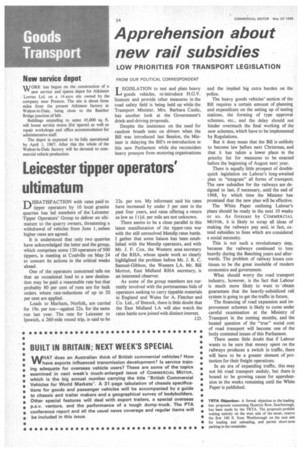Apprehension about new rail subsidies
Page 26

If you've noticed an error in this article please click here to report it so we can fix it.
LOW PRIORITIES FOR TRANSPORT LEGISLATION
FROM OUR POLITICAL CORRESPONDENT
LEGISLATION to test and plate heavy goods vehicles, re-introduce H.G.V. licences and provide other measures in the road safety field is being held up while the Transport Minister, Mrs. Barbara Castle, has another look at the Government's drink-and-driving proposals.
Despite the insistence on the need for random breath tests on drivers when the Bill was introduced last Session, the Minister is delaying the Bill's re-introduction in this new Parliament while she reconsiders heavy pressure from motoring organisations and the implied big extra burden on the police.
The heavy goods vehicles' section of the Bill requires a certain amount of planning and expenditure on the setting up of testing stations, the forming of type approval schemes, etc., and the delay should not hinder overmuch the final working of the new schemes, which have to be implemented by Regulations.
But it does mean that the Bill is unlikely to become law before next Christmas, and that it has taken a lower place in the priority list for measures to be enacted before the beginning of August next year.
There is equally little prospect of doublequick legislation on Labour's long-awaited plan to "integrate" all forms of transport. The new subsidies for the railways are designed to last, if necessary, until the end of 1968, by which time the Minister has promised that the new plan will be effective.
The White Paper outlining Labour's plans should be ready in the next 10 weeks or so. As forecast by COMMERCIAL MOTOR, it is likely to scrap all ideas of making the railways pay and, in fact, extend subsidies to lines which are considered a social necessity.
This is not such a revolutionary step, because the railways continued to lose heavily during the Beeching years and afterwards. The problem of railway losses continues to be the great insoluble of modern economics and government.
What should worry the road transport industry, however, is the fact that Labour is much more likely to want to 'obtain guarantees that the heavily-subsidized rail system is going to get the traffic in future.
The financing of road expansion and improvement schemes is likely to come under careful examination at the Ministry of Transport in the coming months, and the heated question of the "true" social cost of road transport will become one of the hotly contested issues of this Parliament.
There seems little doubt that if Labour wants to be sure that money spent on the railways produces a switch in traffic, there will have to be a greater element of protection for their freight operations.
In an era of expanding traffic, this may not hit road transport unduly, but there is bound to be growing cause for apprehension in the weeks remaining until the White Paper is published.




























































































































